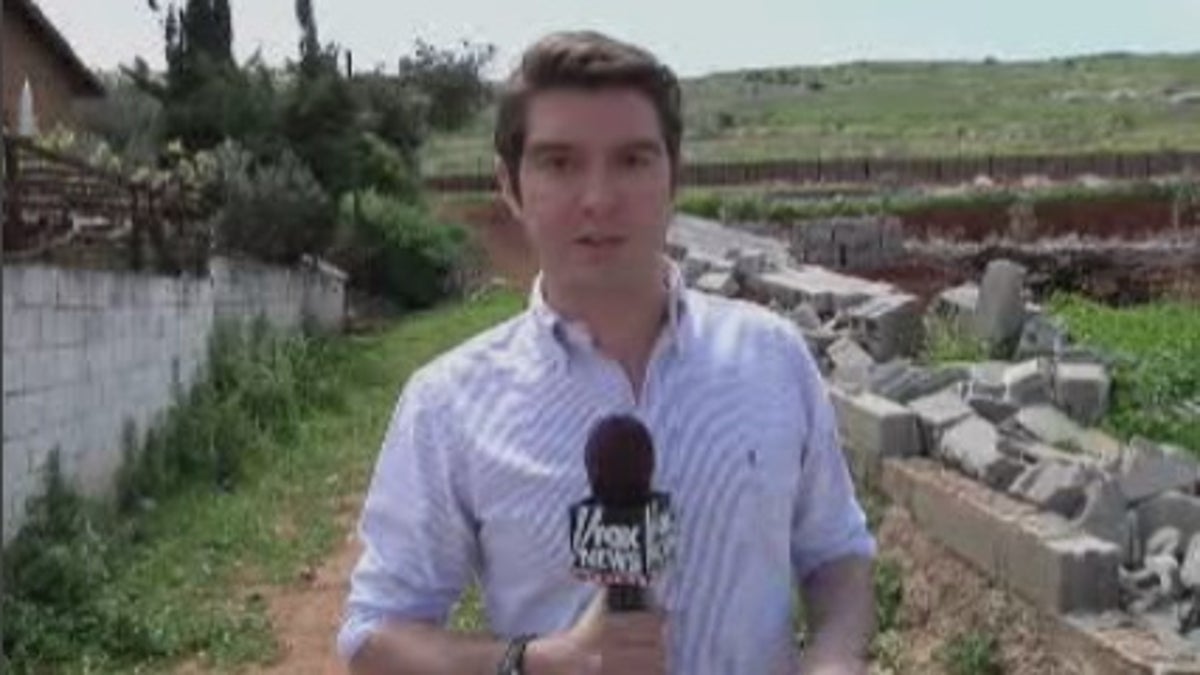The Turkish-Syrian border long has been a lifeline for armed groups fighting inside Syria – a porous crossing 511 miles long over which countless weapons, money, and men have gone to fuel all sides of the civil war.
But today it is almost impossible to cross – so high is the risk of kidnapping or death.

Benjamin Hall reporting from the Turkey-Syria border.
Until a few years ago a handful of journalists were still risking it. I went myself a few times – often up to my neck in water, through a river and in the dead of night.
VIDEO: DIPLOMATS FROM SYRIA, IRAN, RUSSIA MEET IN MOSCOW
But today, journalists must settle for the stories that come across the border, told in safe houses, and in hushed tones in meetings with fighters, refugees, and defectors, in towns bordering Syria.
That is where we’ve spent much of the last week – and the sense we got is that the fate of Syrians now is being decided by other countries. The meeting in Moscow between Secretary of State Rex Tillerson and Russian President Vladimir Putin: one example of how the future of the country is out of Syria’s hands. The country has become a piece in the big game of chess principally between Russia, Iran, Saudi Arabia, Turkey, gulf states, and the U.S.
MIDDLE EASTERN CHRISTIANS FORCED TO BECOME NOMADS
Today, another hugely symbolic meeting took place between the foreign ministers of Iran, Russia, and Syria – again in Moscow – a sign to the world that the alliance between the three remained as strong as ever, and that Russia’s policy toward Assad and Syria wasn’t going to change – even after President Trump’s show of force.
The fact is that Russia has invested so much time, money, and military power in Syria, that it can’t change course now – not to mention its strategic interests in-country, such as its naval base on the Mediterranean in Tartus.
And so it was that after the Tomahawk strike last week, countless Free Syrian Army (FSA) leaders and survivors from the chemical attack flowed across the border to meet journalists – their attempt to get out the stories of brutality inside, in the hope of getting the U.S. to give more support to the opposition. They knew they had a small window during which the world was watching.
As one survivor of the chemical attack told me: “Our stories are our weapons – and we must use them now.”
FSA fighters we met pleaded for help from the U.S. – trying to explain that now was the time to help, and with further military support from the U.S. they could pressure Assad to negotiate.
They also addressed U.S. fears – one that the removal of Assad would create a vacuum in the country which would be filled by jihadis. One FSA military strategist told me that they were not planning on removing the whole regime – only Assad and his dreaded intelligence services; civil society and ministries would stay in place. He said they had learned from the de-Baathification of Iraq post-Saddam Hussein.
They also did their best to convince us that they were fighting both the Islamic State and the regime at the same time – that both were their enemies, and they happily would work with the U.S. on both fronts.
They went further and pointed to the fact that Assad had helped to create ISIS – Syrian regime defectors have told how in the four months leading up to October 2011, dozens of high-ranking Islamists were released from Saidnaya prison – to rejoin the fledgling jihadi group not yet known as ISIS. A way of creating an enemy worse than themselves.
ISIS defectors also have told me how the Assad regime has bought oil from the terror group, with one saying that experts from the regime continued to work in ISIS-held facilities, traveling backwards and forwards.
In March 2015, the European Union imposed sanctions against a Syrian businessman, George Haswani, for being a go-between between the Assad regime and ISIS. U.K. Foreign Secretary Philip Hammond described Haswani as the “middleman” buying oil from ISIS on behalf of the regime.
In December 2015, U.S. Treasury Dept. official Adam Szubin, in a report detailing ISIS finances, said the terror network was “selling a great deal of oil to the Assad regime.” At the time, total ISIS oil sales were at $40 million a month.
It’s also accepted that Assad rarely attacks ISIS – nor for that matter does Russia. According to former State Dept. spokesman John Kirby, 90 percent of Russia's strikes were aimed at moderate rebels, which it sees as a greater threat than ISIS.
But despite all these major issues, it seems more help is not coming, and as more days pass after the gas attack, it appears that the Tomahawk strike is, for the moment, a one-off. Many of the fighters who spoke to us already have headed back to their war, fighting as best they can with the few weapons they have.
Now, again it seems that it’s the major powers who will decide the outcome – and a solution of any kind seems as far away as ever.

